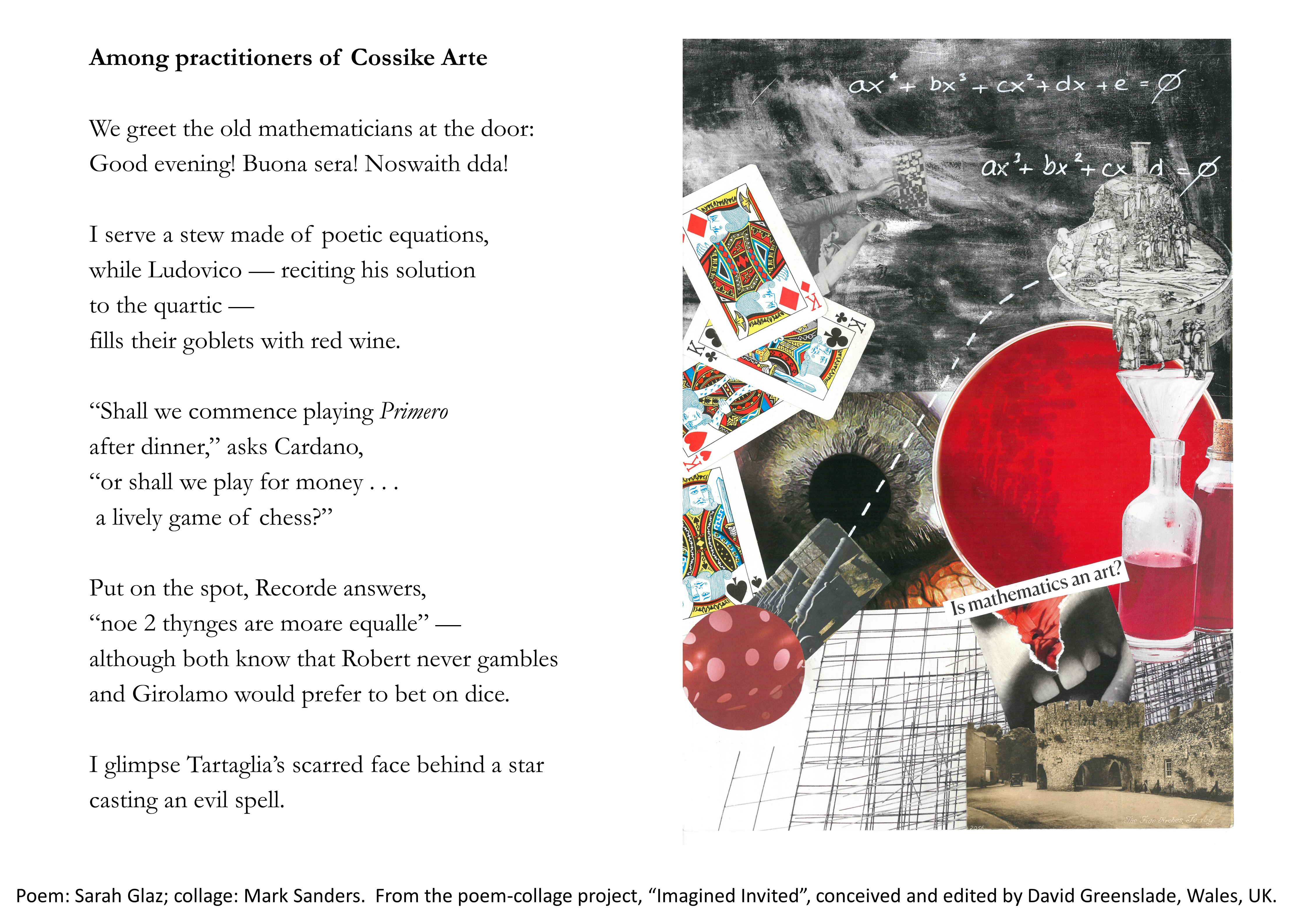
Cardiff Metropolitan University,
Cardiff, Wales, UK
https://the-otolith.blogspot.com/2018/05/david-greenslade.html
The project "Imagined Invited" is
something I started as a 'surrealist game' in the Parisian
tradition of Andre Breton. Writers
were given a poetry prompt asking them to compose a poem in which
they invite to dinner anyone from time and space, provided that at
least one guest has a connection to Wales, and another game is
mentioned in the poem. Because I am Welsh and my wife is Romanian
it was shared within a circle of writers mainly (but not only)
from these two countries. The
visual element, thanks to Mark Sanders (collagist), takes an
exploratory and divergent approach ―
blending the pleasures of research with visual resolution
and expanding the associations of the poet. There are twenty poets
in all and, in itself, their cast of invited guests makes quite an
inspiring list. The
wide age range and international variety of contributing writers
has resulted in a slim anthology of surprising stylistic and
thematic content. By
combining text and the fragmentary/juxtaposition method of collage
the metaphoric possibilities are greatly and pleasantly amplified. It would be terrific if
this approach could inspire more cooperative projects between
poets and artists with an interest in mathematics.
Sarah Glaz: The poem "Among practitioners of
Cossike Arte"
University of Connecticut,
Storrs, Connecticut, USA
http://www.math.uconn.edu/~glaz
All the characters appearing in this
poem, except myself, lived in Europe during the Renaissance, a
period of time in which "algebra" --
still in its infancy -- was called Cossike Arte ("The Art of Things")
and a card game called, Primero,
became all the
rage throughout the continent. The Welsh invitee is Robert Recorde (1510 -
1558), physician and mathematician, best known for his invention
of the equal sign, =, which
he justified in his algebra book, The Whetstone of Witte,
with the words "because
noe 2 thynges are moare equalle." The other figures are all
Italian mathematicians who were instrumental in the development of
algebra: Girolamo
Cardano (1501 - 1576), physician, mathematician, writer,
and gambler, who solved the general case of the cubic equation; Ludovico Ferrari (1522 -
1565), Cardano's servant
and student, who solved the quartic equation; and casting a
malevolent eye on the scene, Tartaglia, "the stammerer," (1500 - 1557) who solved an
important case of the cubic on which both Cardano's and Ferrari's
solutions relied. Tartaglia wished to keep his solution a secret,
but was persuaded to hand it over to Cardano -- in the form of a
poem -- when the latter promised to keep it to himself. Cardano's
publication of this solution in his algebra book, Ars Magma, resulted in a
bitter life-long feud between the two men.
Mark Sanders: The collage "Among practitioners of
Cossike Arte"
Rushden, Northamptonshire, UK
The chance meeting of my sewing
machine with David's umbrella (see Lautreamont) has
proven to be a most invigorating and expansive experience. Since
being invited to take part in this game, I have been introduced,
among those I already know, to many characters (invitees) with
whom I have previously been utterly unfamiliar. Researching these
players in particular has proven to be a most exciting approach to
my collage construction, as I aim to represent the thought
processes of the poet/host, not necessarily or entirely literally, but hoping to
make their guests' identities, quirks and foibles recognizable, if you know what you are
looking for...My approach here has been to combine material
already in my stockpiles, with components researched and sourced
bespoke as required -- a process which in itself has led me along
several paths which have yielded fascinating and unexpected links
between the poems (and poets!). My engagement with
Surrealism tends more toward the visual than through the written
word. Though how can anyone fail to see the Marvellous in the
notion of such serious men as Cardano and Tartaglia, exchanging
mathematical blows...in
verse! Collagist notes for viewers
who might appreciate a way into the work.
